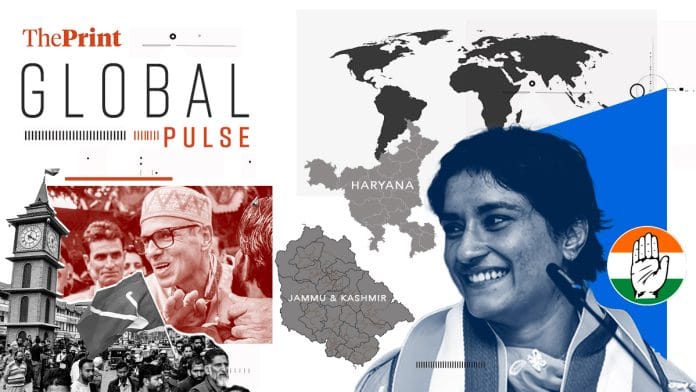New Delhi: If there’s one thing about India that has held global media’s attention the past few weeks, it’s the elections in the state of Jammu and Kashmir.
Foreign publications across the spectrum focused their trained eyes on the valley as it went to polls for the first time in a decade. Kashmir has long been cast as the subcontinent’s most famous bone of contention, and the revocation of its special status in 2019 looms large for global media.
So, it’s no surprise that nearly every publication was following the elections in Kashmir closely, offering thorough coverage weeks before voting began—carrying wires but also publishing detailed reports.
The biggest takeaway, unsurprisingly, is the BJP’s loss at the hands of the alliance opposing Article 370. Sample these headlines: “Biggest Kashmir party opposed to India’s stripping of region’s autonomy wins most seats in election,” says the Washington Post, while the Guardian and Al Jazeera take a more political stance with “Opposition Congress party wins power in Indian-administered Kashmir” and “Party opposed to India’s stripping of Kashmir’s autonomy wins election”, respectively.
The Modi government’s hopes are dashed in Kashmir, the Guardian reports, pointing to this election as voters’ “first opportunity to have a political voice since the removal of article 370 five years ago and to express their dissatisfaction with the Modi government’s actions”. It notes the BJP’s performance in Hindu-majority Jammu, where the party did well. Plus, local functionaries on the ground were buoyed by the BJP’s performance in Haryana, it reports, inadvertently underlining the dissonance between Kashmir as a polling issue across India and the domestic politics of Kashmir itself.
Al Jazeera’s report focuses more on the National Conference, quoting both Omar Abdullah and Farooq Abdullah front and center. Calling the vote a “de facto referendum” on Article 370, the story says “the assembly has only nominal powers over education and culture. New Delhi also has the power to override legislation and will continue to appoint the governor.”
The Washington Post highlights the fact that after 2019, the region of Jammu and Kashmir “has since been on edge with civil liberties curbed and media gagged.”
“Except for the BJP, most parties who contested the election campaigned on promises to reverse the 2019 changes and address key issues like rising unemployment and inflation. The Congress party favored restoring the region’s statehood. The BJP has also stated that it will restore statehood, but has not told when it would do it,” the report says. “The BJP has vowed to block any move aimed at undoing most of the 2019 changes but promised to help in the region’s economic development.”
The story is peppered with Kashmir’s geopolitical history. The issue has been summarised as the reason that India and Pakistan have gone to war two out of three times, and the struggle over its autonomy boiled down to militants in the valley—which India says is sponsored by Pakistan, a charge Pakistan denies—“fighting New Delhi’s rule since 1989”.
The Wall Street Journal similarly manages to condense the conflict into a few tight paragraphs, and looks at the limited amount of legroom the new government will have in a story headlined “India Held Elections in Kashmir. The Winners Will Have Little Power.”
New Delhi will continue to have direct control over security, law, and the appointment of key officers, as well as the power to overrule the local legislature. The story draws attention to the higher voter turnout in Kashmir, both during the general elections and the state elections.
The elections are the only way that Kashmir’s unemployed youth can try and get the government’s attention, it reports, quoting a 25-year-old political science graduate who drives a taxi. “I voted in the hope of getting a job that suits my education,” he told the WSJ.
The New York Times zooms out in their coverage and look at both Kashmir and Haryana. “India’s Political Carnival Is Back in Season, With Mixed Results for Modi,” the headline declares.
“India’s states matter in their own right—the biggest have populations to match Brazil’s or Japan’s, and their leaders wield enormous power. But for those hoping to use the results as tea leaves to read the whole country’s political future, the strongest indication was only that India appeared to be reverting to more of its pre-Modi norm, where local issues matter most and coalition building gets tricky,” NYT reports, trying to distill the complex cocktail of Indian politics.
The case of Jammu and Kashmir, it rightfully reports, is “especially complex and cannot be translated into any national trends.”
“The B.J.P.’s disappointment there was significant, if not surprising. It seemed clear that Kashmiris would rather vote for anyone, even a local party in alliance with mainstream Indian politicians, than the Hindu-first leaders who revoked their special status in 2019,” the story continues, also quoting disillusioned Kashmiris.
One shopkeeper said he found it “disheartening that the Indian public doesn’t understand that the B.J.P. had failed to bring the normalcy and development it had promised.”
The story then quickly contrasts Kashmir with Haryana, jumping to the story of Olympic wrestler Vinesh Phogat’s win against the BJP on a Congress ticket. “With the raucous carnival of Indian democracy fully returned, small battles can take on bigger dimensions,” the NYT says.
Also read: Muizzu’s India trip shows diplomacy ‘naivety’ & IAF shouldn’t see China as rival—global media






